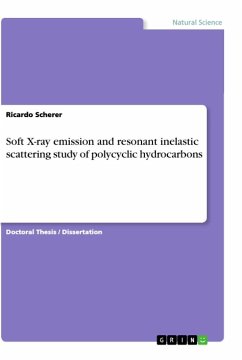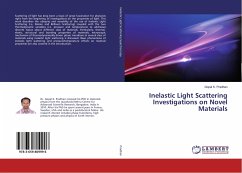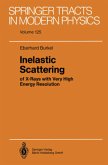Doctoral Thesis / Dissertation from the year 2002 in the subject Physics - Experimental Physics, grade: 1, University of Cologne (2. Physikalisches Institut), language: English, abstract: This thesis comprises a detailed study of the electronic properties of the polycyclic hydrocarbons tetracene, perylene and coronene. The at room temperature grown organic layers consisted of a up to several hundred nanometer thickness, and have been studied with the experimental techniques soft x-ray emission spectroscopy (SXES) and NEXAFS-spectroscopy by means of synchrotron radiation. In particular, resonant inelastic scattering (RIXS) was employed in order to obtain possible band structure or MO-symmetry information of the studied systems.The studied materials consist of large organic molecules, evaporated under high vacuum on silicon wafers. The goal was to figure out, whether inside these organic layers the hydrocarbon molecules polymerize and form a band structure or if the hydrocarbon molecules do not interact with each other and retain their original molecular like symmetry and behavior. The discrete peaks in the hydrocarbon NEXAFS-spectra could be assigned by comparison with the literature to chemical shifted C1s pi transitions, caused by different chemical surrounded C-atoms. Hence, due to excitation on a certain pi -resonance only C1s-electrons of equal C-atoms can be excited, which leads to a site selective excitation.The fluorescent decay of the created hole, which is as well localized on these former excited C-atoms was recorded energy dispersed in the SXE-spectrometer. This method is usually referred to as SXE. Therefore, the local MO-density was recorded. Hartree-Fock based ground state MO-calculations have been performed for each molecule, in order to simulate the SXE-spectra. Good agreement between experiment and simulation was shown, under the strict retainment of symmetry selection rules along the transitions. This result states, that the different hydrocarbon molecules conserve their symmetry and structure in an up to several hundred nanometer thick organic layer. Only in the region of the valence band maximum (pi-states) weak indications for a band dispersion could be observed.
Hinweis: Dieser Artikel kann nur an eine deutsche Lieferadresse ausgeliefert werden.
Hinweis: Dieser Artikel kann nur an eine deutsche Lieferadresse ausgeliefert werden.








